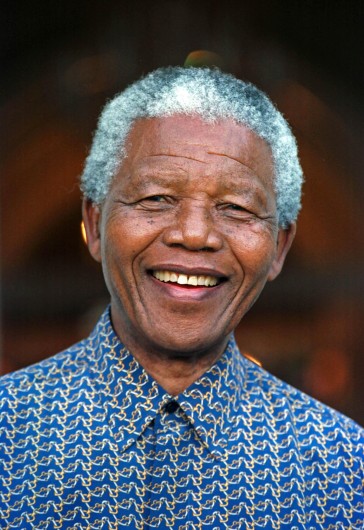
Former South African President Nelson Mandela, pictured here in 1996, died Dec. 5.
Credit: Courtesy of MCT
Some Ohio State students reacted to the announcement of Nelson Mandela’s death Thursday by remembering the leader.
Mandela died at the age of 95 in his home as a result of recurring bouts of illness coupled with old age.
Mandela, who helped bring an end to apartheid, a system of racial segregation, was the first black South African president. He was elected in the first democratic elections in the history of South Africa in 1994, according to the South African Government’s website.
Prior to that, Mandela became a member of the African National Congress party in the 1940s, where he encouraged “both peaceful protests and armed resistance” against the existing regime that led to his imprisonment for 27 years.
Fourth-year in political science Micah Dillard said Mandela’s worldliness was something unseen in many leaders around the world.
“It’s rare for a president (of) a country to have such a strong domestic presence, but also a strong international presence as well,” Dillard said.
Dillard added that Mandela’s time in jail was a testament to Mandela’s strong belief system.
“From going to spending a quarter of a century in prison to becoming the first black South African president, and sticking to his beliefs to do that, he was amazing,” Dillard said. “His commitment to ending apartheid is truly an inspiration.”
U.S. President Barack Obama spoke Thursday night shortly after Mandela’s death was announced.
“Today, he has gone home and we’ve lost one of the most influential, courageous and profoundly good human beings that any of us will share time with on this Earth,” Obama said. “He no longer belongs to us; he belongs to the ages.”
In the years after his presidency, Mandela engaged in efforts to cure AIDS and worked with various organizations to work toward solving international problems.
“The fact that he used his post-presidency so powerfully to make changes with big issues in Africa like AIDS is what I’ll remember the most about Mandela,” Dillard said. “He spent most of his time championing the fight against AIDS on the continent and used his humanitarian nature and voice to help countries gain hope who were under the rule of dictators.”
Obama said Nelson Mandela had a profound influence on his life and was someone he was inspired by while growing up.
“I am one of the countless millions who drew inspiration from Nelson Mandela’s life … like so many around the globe, I cannot fully imagine my own life without the example that Nelson Mandela set, and so long as I live, I will do what I can to learn from him,” Obama said.
Nicholas Macek, former president of the OSU Model African Union and a third-year in geography, said Mandela’s respect for others was the most important trait Mandela possessed.
“The man had humility, a respectfulness and level of forgiveness that isn’t terribly popular to international figures and he is an extraordinary inspiration (for) those people who work every day towards social justice and the greater good,” Macek said.
Macek also said countries like the United States can learn something from Mandela and the life he led.
“His ability to work with people who imprisoned him to find a compromise to help the betterment of his country is incredible,” Macek said. “Our political leaders (in the U.S.) can learn that while the bickering makes good television, sitting down and talking about what our nation needs to get done is a lot more important to the well-being of all citizens.”
Glenna Ball, a second-year in French, said she’ll remember her favorite Mandela quote: “For to be free is not merely to cast off one’s chains, but to live in a way that respects and enhances the freedom of others.”
“I think that quote sums up life perfectly,” Ball said. “Because we aren’t truly free until everyone else is free and sees one another in that way.”


